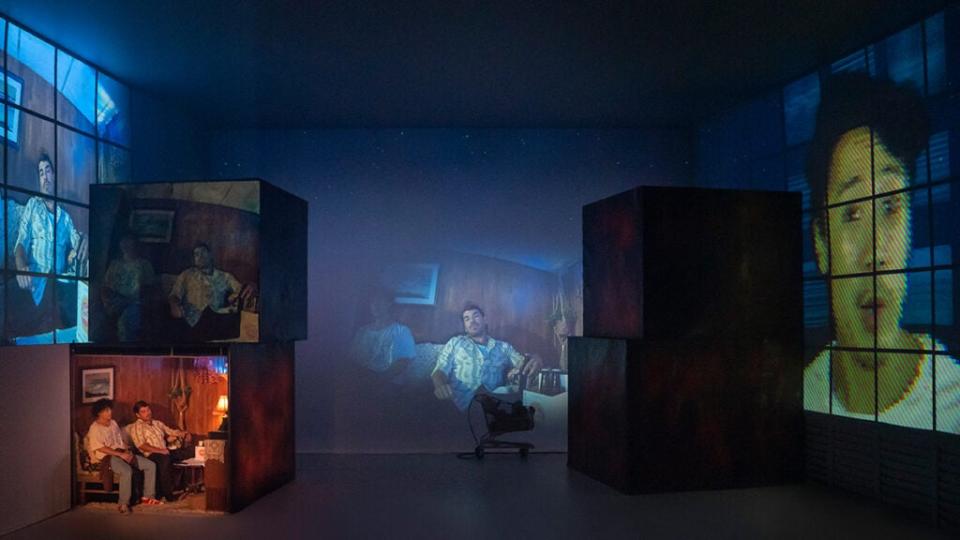‘American (Tele)visions’ Off Broadway Review: Why the Tube Is Bad for Our Health
Included in the Playbill is a bibliography of sources for the play we’re about to see. It is the kind of list usually reserved for a biography or some other kind of nonfiction book. It is an impressive bibliography that ranges from Pedro Almódovar’s “Parallel Mothers” to Susan Sontag’s “Reborn” to Alexander McQueens’ Women’s Spring/Summer Runway Show, 2001. No doubt about it: Victor I. Cazares’s new play, “American (Tele)visions,” which opened Thursday at New York Theatre Workshop, is chock full of borrowed ideas.
Possible sources that Cazares leaves out but might have included are the plays of Taylor Mac and Tony Kushner. “American (Tele)visions” attempts to replicate the fun and outrageousness of Mac but keeps getting stuck in the didacticism and moral outrage of Kushner.
In Cazares’ 100-minute one-act play, a Mexican immigrant family without documentation works around the clock at low-paying jobs in the United States, where they shop at Walmart and eat at McDonald’s and watch telenovelas and play video games. They also say things like, “Families that pay together stay together.”

They are not only drowning in schlock culture, they become schlock culture, spouting philosophy picked up from what they see on the tube to guide their lives. Adding to all the political and economic challenges facing the mother (Elia Monte-Brown) and the father (Raul Castillo) are their two children: The adult son, Alejandro (Clew), is in love with another man, an Asian immigrant named Jesse (also played by Clew); and their daughter, Erica (Bianca “b” Norwood), is either lesbian or transgender and hangs out with a guy, Jeremy (Ryan J. Haddad), who is definitely gay and buys Erica boy toys at Walmart in exchange for Erica’s Barbie dolls. Kids have a way of getting what they want, despite objections from mom and dad.
Cazares tells us not only that we are what we eat, but also that we are what we make. Alejandro and Jesse, for example, make chain-link fences, and so find themselves trapped in the bigotry around them. As they tell us, “We make chain-link fences….To keep us out, to keep us in.” It is what distinguishes the LGBTQ community from any other minority group: They don’t even have the support of their own families.
“American (Tele)visions” raises these as well as many other important issues, but fails to put them into a compelling narrative despite lots of terrible stuff slamming all the characters. It is more lecture than play. When the mother switches outfits to show up as a human Bar Code, named Wal-Martina, she announces, “Welcome to Lay Away Land. The Final Stage of Late Stage Capitalism.”
Also Read:
Scott Rudin and Broadway Ad Agency Settle $6.3 Million Lawsuit Over Alleged Unpaid Fees
Cazares is nothing if not blunt in his effects. Regarding the characters Jesse and Alejandro, Cazares handles the double casting of Clew by having Mom instruct her dead son’s lover at the top of the show, “Jesse, here, you play Alejandro.”
Ruben Polendo’s direction is flashy, and is in complete sync with Bretta Gerecke’s equally flamboyant costume and scenic design, which features four huge metal boxes that open to reveal things both mundane and fantastical. Clew and Haddad manage to bring a light tone to the proceedings as they deliver all the brand names. After 15 minutes, unfortunately, the mere mention of Malibu Barbie or Happy Meals or Downy fabric softener fail to provoke even a mild giggle.
In the end, watching “American (Tele)visions” is more than a little like watching too much TV: The many familiar products being hawked simply blur together.
Also Read:
‘This Beautiful Future’ Off Broadway Review: Karaoke Perks Up a Doomed WWII-Era Love Story

 Yahoo Movies
Yahoo Movies 